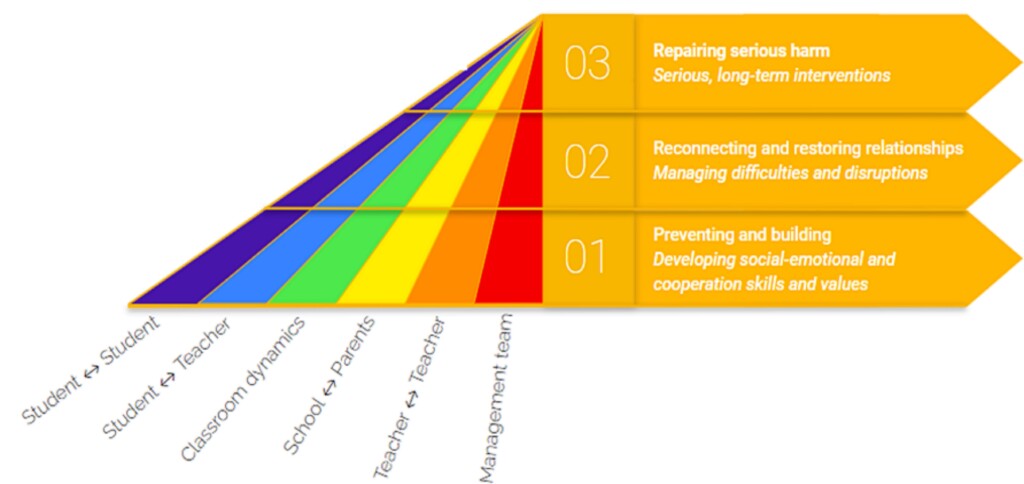| AVALEHELE | PROJEKTIST | PILOT SCHOOLS | ABOUT THE CARING SCHOOL MODEL | SUPPORTIVE TOOLS |
The main goal of the Caring School Model is to support schools in creating healthy, professional and caring relationships, necessary for meaningful learning environments and a healthy school culture, through the systemic introduction of Restorative Practices on all levels of communication. The model is grounded in the principles of restorative justice, inspired by humanistic psychology, incorporating social emotional learning competencies and backed by best practice and research findings from around the world.
How do we get there?
The Caring School Model is a fully supported process applied in a whole-school approach on three levels of urgency addressing six levels of relationships. (expandable bullet points on each bolded statement)
CSM is a fully supported process, which includes:
- A series of trainings on change management and restorative approaches to enhance the competencies of school teams;
- All necessary materials, guidelines, templates and support documents needed for the process;
- Diagnostic and impact measurement;
- A systematic cooperation process with a designated consultant throughout the 3 years of implementation and beyond.
The model is applied in a whole-school approach, meaning:
- ALL parts of the school work together and are committed to the goal – school management, teachers, specialists and other staff, students, parents and the wider community;
- Attention is paid to building healthy and supportive relationships between ALL parties at all levels;
- It is a collaborative activity that is planned as strategic and consistent, the goals are in the school’s development plan and related to the school’s vision;
- It is not just about what happens in the classroom, but about what happens on a daily basis in the school and how students, teachers, parents, management and the wider community experience their lives in and around the school, what their well-being and health are like.
Tailored to the needs and contexts of each school, the Caring School model entails a 3 year implementation plan that includes three levels of urgency:
- Preventing and building: First and foremost, focusing on the development of social-emotional and cooperation skills and values that aid in the prevention of relational difficulties and challenging behavior, and the formation of safe, nourishing and meaningful relationships.
- Reconnecting and restoring relationships: Equipping the staff and students with skills for managing difficulties and disruptions, and engaging with conflict in a caring and respectful manner that moves from punishment to restorative practices that help to repair broken connections and rebuild trust.
- Repairing serious harm: Building skills for dealing with serious cases and employing long-term restorative interventions
These levels are addressed in six aspects of relationship within the school:
- Student – student level;
- Student – teacher level;
- Classroom level;
- School – parents level;
- Teacher – teacher level;
- Management level.
IMPLEMENTATION PLAN
The model provides a complete process, a framework that can be used to reflect on everyday practice, assess the current situation, identify developmental needs, plan the implementation and evaluate the progress.
The implementation plan includes training and consultation needs and a detailed process of initiating and managing change over the span of 3 years, starting with the buy-in of the school leadership, focused cooperation with the newly-formed implementation team, continuing with the engagement and training of the wider community of staff, through to working with parents and the children directly.
Brief summary of implementation plan:
- school self-assessment and commitment to cooperation
- forming and training school implementation team
- introduction of model to the whole school community
- impact assessment phase 1
- strategic planning for the next school year
- continued consultation
- school-wide training
- regular reflection meetings
- annual conference for participating schools
- impact assessment phase 2
- broader strategic planning for engagement of parents
- continued consultation
- continued professional training and supervision
- further basic teachers’ training (if needed)
- annual conference
- impact assessment

